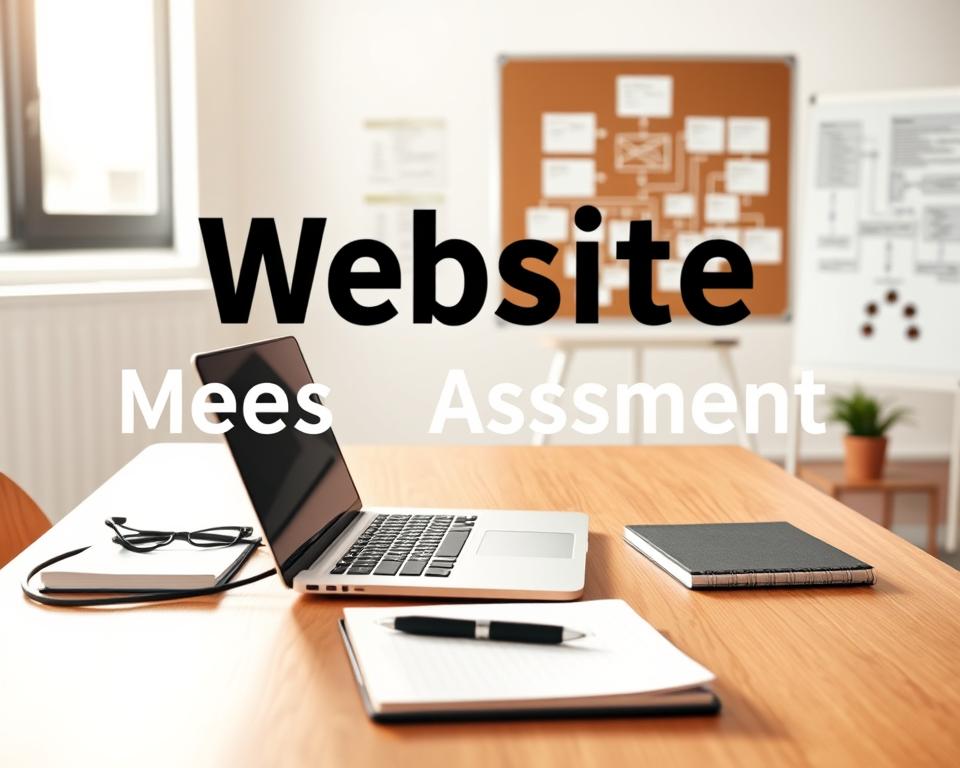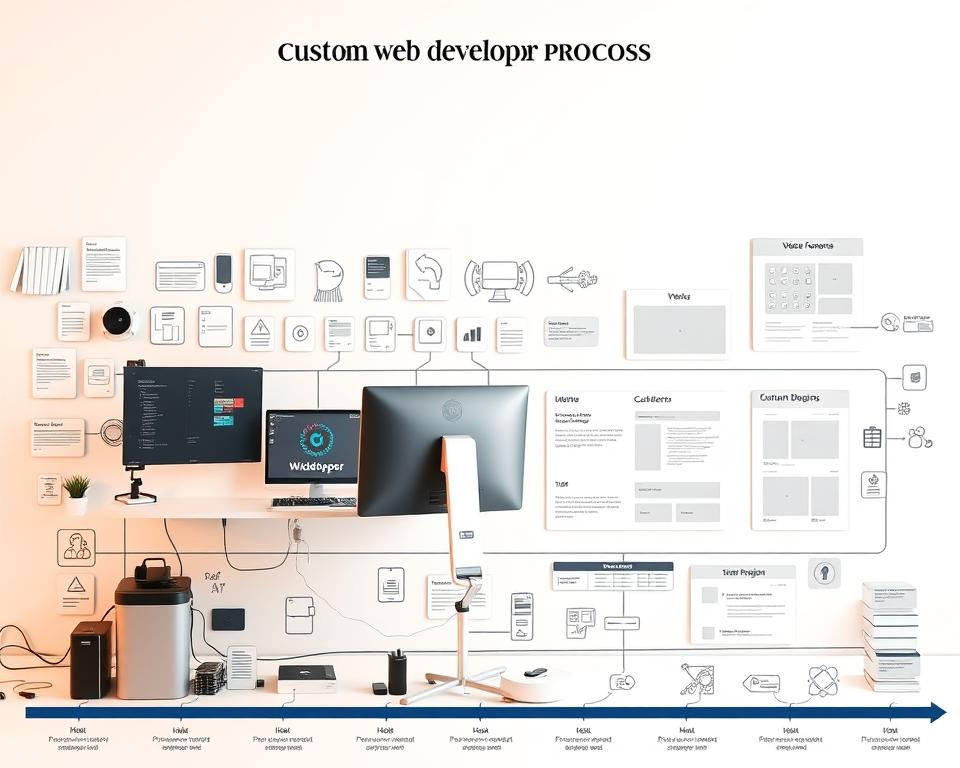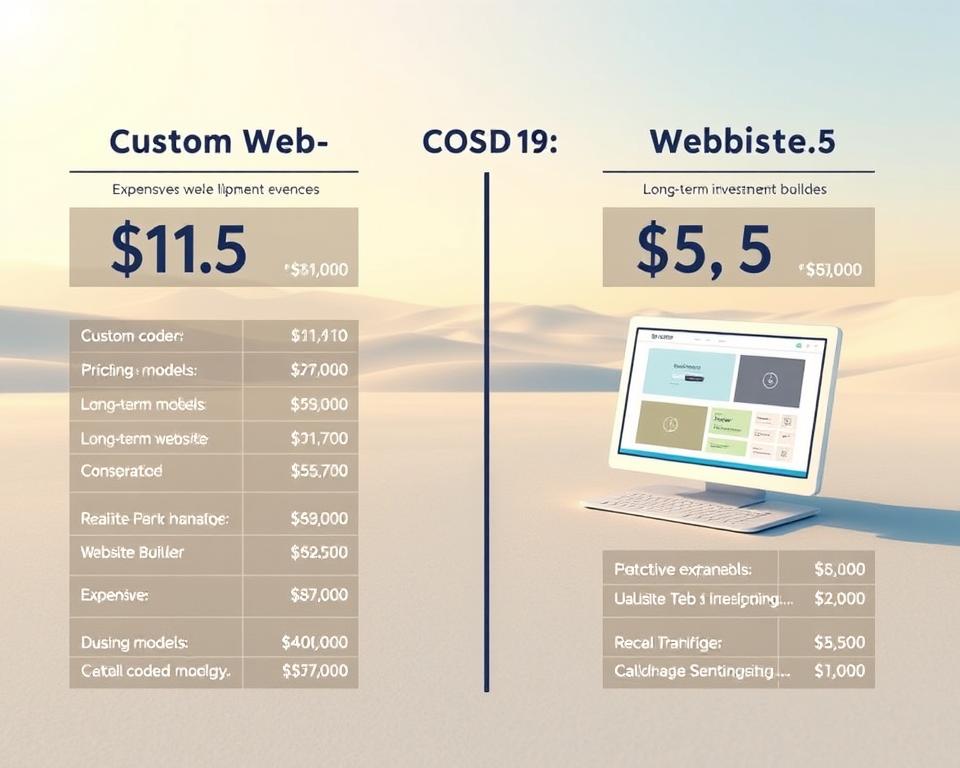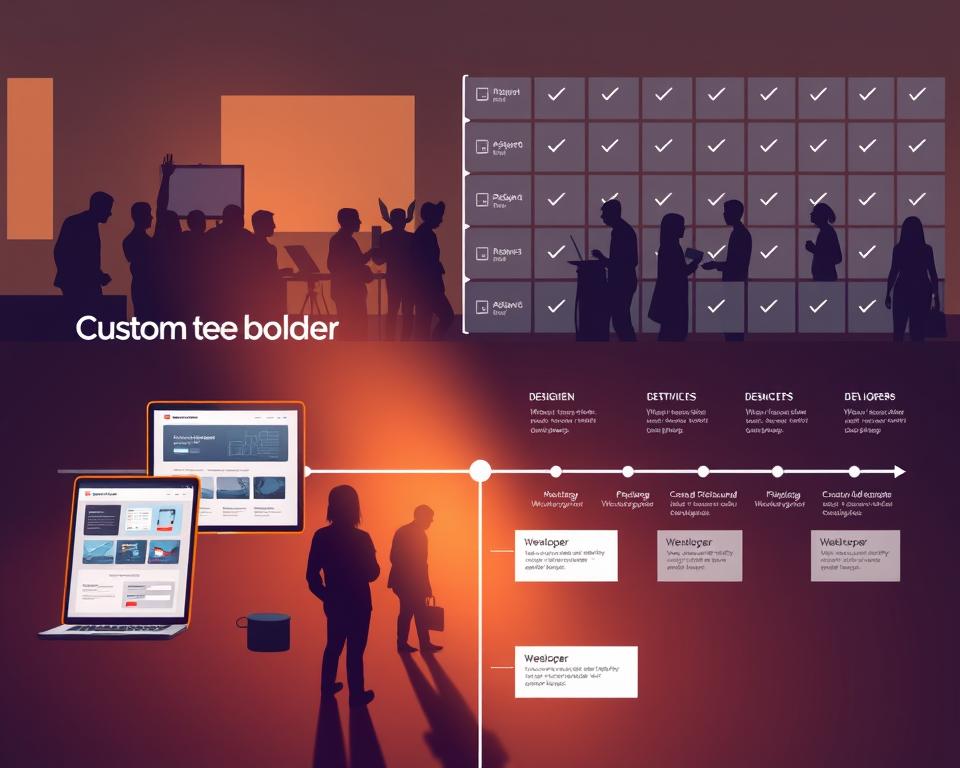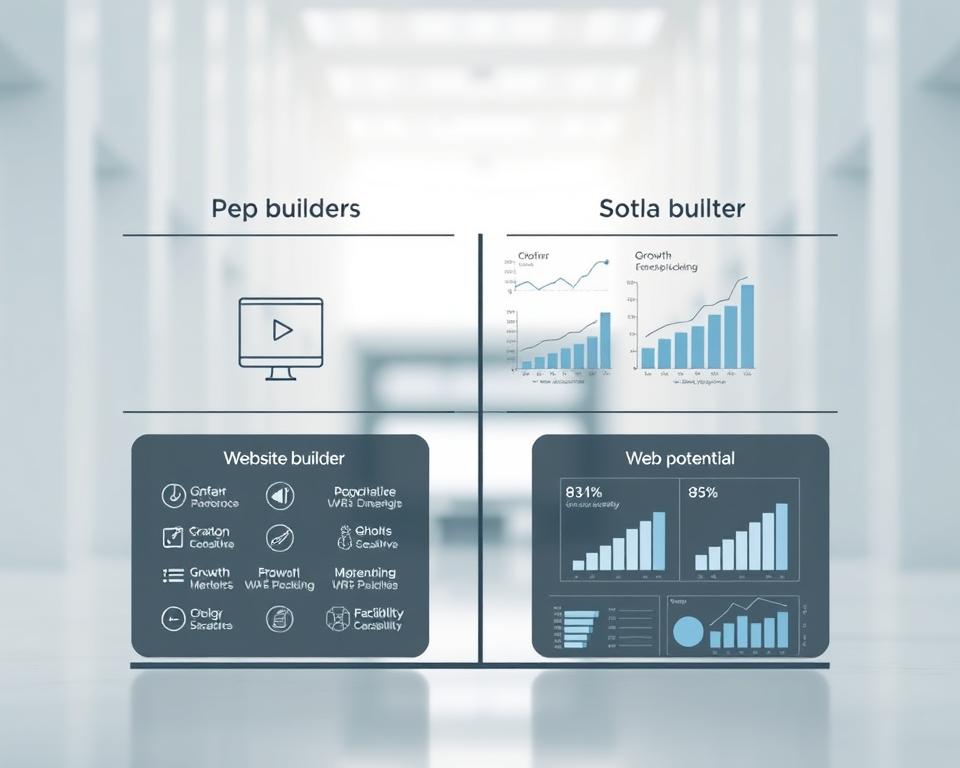In today’s digital world, businesses must choose between custom web development and website builders. This choice greatly affects their online success.
The debate centers on the pros and cons of each option. Website builders are fast and affordable. But, custom web development offers unique features and flexibility.
We will look at the main differences between these two choices. This will help businesses make a smart decision that fits their needs and goals.
Table of Contents
Key Takeaways
- Understanding the fundamental differences between custom web development and website builders.
- Evaluating the benefits and drawbacks of each approach.
- Identifying key factors that influence the decision-making process.
- Exploring the importance of tailored functionality and flexibility.
- Learning how to make an informed decision that aligns with business goals.
Understanding Your Website Needs
Before choosing between custom web development and website builders, it’s key to know what your website needs. This knowledge is the base of your decision.
Identifying Your Business Goals
First, identify your business goals. Do you want to boost online sales, engage more customers, or offer a service? Your goals will show what features and functions your site needs. For example, if you aim to sell online, you’ll need a platform with secure payment options.
Assessing Your Technical Resources
Assess your technical resources too. Look at your team’s tech skills and how much time they can spend on your site. If your team isn’t tech-savvy, you might prefer something easier to use and supported.
Determining Your Budget Constraints
Determine your budget limits as well. Your budget will decide if you can go for custom development or if a website builder is better. Think about both the start-up and ongoing costs, like maintenance and future upgrades.
By carefully looking at these points, you’ll be ready to pick between custom web development and website builders. This ensures your site fits your business needs well.
What Is Custom Web Development?
Custom web development means making websites from scratch for specific business needs. It creates a digital solution that fits a company’s unique goals and needs.
The Process of Custom Development
The process starts with understanding the business’s needs and goals. Then, the design and development phases follow. Here, the website is built using different programming languages and technologies.
- Requirements gathering and analysis
- Design and prototyping
- Development and testing
- Deployment and maintenance
Every step is important to make sure the final product meets the client’s expectations and is delivered on time.
Types of Custom Development Solutions
Custom web development can lead to different solutions, such as:
- E-commerce platforms
- Content management systems (CMS)
- Customer relationship management (CRM) systems
- Custom web applications
These solutions aim to improve business operations, enhance customer engagement, and drive growth.
Key Technologies in Custom Web Development
Custom web development uses various technologies, including:
- Front-end development frameworks like React and Angular
- Back-end programming languages such as Java, Python, and Ruby
- Databases like MySQL and MongoDB
These technologies help developers create strong, scalable, and secure web applications.
What Are Website Builders?
Website builders make creating websites easy for everyone. They offer tools and templates to help you build a professional site without coding. This is great for businesses of all sizes.
Popular Website Builder Platforms
Many website builders are popular for their simplicity and features. Wix, Squarespace, and Weebly are among the top choices. They have lots of templates, drag-and-drop tools, and support to help you build your site.
How Website Builders Work
Website builders have an easy-to-use interface for designing and customizing sites. They offer many templates to match your brand. You can add text, images, and videos easily without coding.
Template-Based vs. Drag-and-Drop Builders
Website builders come in two types: template-based and drag-and-drop. Template-based builders let you customize pre-made templates. Drag-and-drop builders give you more freedom to build from scratch. Knowing the difference helps you pick the right one for your business.
Cost Comparison: Custom Development vs. Website Builders
Choosing between custom web development and website builders means looking at costs. The cost of a website isn’t just the initial price. It also includes ongoing maintenance and hidden fees.
Initial Investment Requirements
Custom web development costs a lot upfront. Prices vary based on project complexity, technology, and developer rates. Website builders, on the other hand, have lower initial costs. They offer tiered pricing plans.
Ongoing Maintenance Costs
Both custom and builder websites need ongoing care. Custom sites need updates, security patches, and sometimes redesigns. Builders handle updates and security but users must update content and might need to switch plans.
Hidden Expenses to Consider
Hidden costs can pop up in both options. Custom sites might face costs for third-party services or scope changes. Builders might need extra money for premium features or integrations.
| Cost Factor | Custom Web Development | Website Builders |
|---|---|---|
| Initial Investment | $5,000 – $50,000+ | $10 – $50/month |
| Ongoing Maintenance | $500 – $5,000/year | $0 – $500/year |
| Hidden Expenses | Third-party integrations, scope changes | Premium features, migration costs |
In summary, custom web development costs more upfront but offers flexibility. Website builders are cheaper to start but might cost more as your business grows or hits limits.
Time Investment: Development Timelines Compared
When choosing between custom web development and website builders, timelines are key. The time it takes to launch a website affects your business strategy and market entry.
Custom Development Project Timelines
Custom web development projects are complex and take longer. The timeline depends on the project’s scope, feature complexity, and technology used.
- Planning and discovery phase: 1-4 weeks
- Design phase: 2-6 weeks
- Development phase: 12-24 weeks or more
- Testing and iteration: 4-8 weeks
- Launch preparation: 1-2 weeks
The total time for a custom web development project can be 20 to 50 weeks or more, based on complexity.
Website Builder Implementation Schedules
Website builders offer a quick way to launch a website. They use pre-designed templates and drag-and-drop tools, speeding up the process.
- Choosing a template and customizing: 1-3 days
- Content creation and integration: 2-5 days
- Testing and adjustments: 1-2 days
- Launch: 1 day
A website builder can get a website live in 5 to 10 days.
Time-to-Market Considerations
In today’s fast digital world, time-to-market is crucial. A quick launch lets businesses act fast, adapt to changes, and stay ahead.
| Development Approach | Typical Timeline | Flexibility |
|---|---|---|
| Custom Web Development | 20-50 weeks | Highly customizable, complex features possible |
| Website Builders | 5-10 days | Limited by template and platform constraints |
When choosing between custom web development and website builders, consider timelines and how they fit your business goals and strategy.
Design Flexibility and Customization Options
Creating a website means focusing on design flexibility. This is about making your site fit your brand perfectly. A flexible design makes your site more engaging and user-friendly.
Creative Freedom in Custom Development
Custom web development gives you creative freedom. You can make a website that’s truly yours. Developers can add special features that match your brand’s vision.
Template Limitations with Website Builders
Website builders use pre-made templates, which can limit your design options. While they’ve improved, they can’t offer the same level of customization as custom development. Templates might make your site look generic, not truly representing your brand.
Achieving Brand Consistency Across Platforms
Keeping your brand consistent is vital. Custom web development helps by allowing specific design elements across platforms. This consistency builds trust and recognition with your audience.
Knowing the differences between custom web development and website builders helps you choose the best for your business.
Technical Skill Requirements
Technical skills are key in choosing between custom web development and a website builder. The level of technical skill needed can greatly affect your choice.
Skills Needed for Custom Web Development
Custom web development needs a lot of technical skill. You need to know programming languages like Java, Python, or Ruby. You also need to understand database systems like MySQL or MongoDB. Plus, you must know how to use HTML, CSS, and JavaScript for front-end development.
Learning Curve for Website Builders
Website builders, however, are easier to use. They require little to no coding knowledge. Tools like Wix, Squarespace, and Weebly make it simple to create a website with their drag-and-drop features and user-friendly interfaces.
When to Hire Professionals vs. DIY
Choosing between hiring pros and doing it yourself depends on your skills and the project’s complexity. For complex projects, hiring experts is best. For simpler ones, using a website builder can save money.
| Aspect | Custom Web Development | Website Builders |
|---|---|---|
| Technical Skills Required | Advanced programming skills | Little to no coding knowledge |
| Learning Curve | Steep | Gentle |
| Cost | Higher upfront cost | Lower upfront cost |
Ownership and Control Considerations
When choosing between custom web development and website builders, think about ownership and control. Each option affects how much you can control your website.
Intellectual Property Rights in Custom Development
Custom web development lets you keep full rights to your website. You control the design, how it works, and what’s on it. This means you can change things easily as you want.
Platform Dependencies with Website Builders
Website builders, however, might limit your control. Since your site is built on their platform, you must follow their rules. This includes their pricing and any changes they make.
Data Ownership and Portability
Thinking about data ownership and portability is also key. Custom sites usually give you more control over your data. This makes it easier to move or change how data is handled. But, website builders might make it hard to take your data with you or switch platforms.
Important things to consider are:
- Control over intellectual property: Custom development gives you more power.
- Platform dependency: Website builders can make it harder to change things.
- Data portability: Custom sites make it easier to move your data.
Scalability and Growth Potential
It’s important for a website to grow with the business. As companies grow, their online space must too. This helps them face new challenges and seize new chances.
Scaling Custom-Built Websites
Custom-built websites can grow a lot. They can handle more traffic, new features, and more content. This is because they’re not stuck with pre-made templates.
Key benefits of scaling custom-built websites include:
- Flexibility to add new functionalities as needed
- Ability to handle increased traffic without performance issues
- Ease of integrating new technologies and tools
Growth Limitations of Website Builders
Website builders are easy to use but have limits. These can stop growth. They might not let you customize much, have bandwidth limits, or work with many third-party tools.
| Feature | Custom Web Development | Website Builders |
|---|---|---|
| Scalability | Highly scalable | Limited by template and platform constraints |
| Customization | Highly customizable | Limited customization options |
| Integration | Flexible integration with third-party tools | Limited integrations available |
Planning for Future Expansion
Businesses should think about growth when choosing a website. They should look at what they need now and what they might need later. This helps pick the right solution for the future.
Knowing how different websites can grow helps businesses make smart choices. This supports their success over time.
SEO Capabilities and Performance
Businesses aim for online success, and their website’s SEO is key. A well-optimized site boosts search rankings and attracts more visitors.
SEO Control in Custom Development
Custom web development gives SEO control like no other. Companies can shape their site’s structure and content to fit their SEO plans. They can use structured data markup and custom URL structures to stand out in search results.
SEO Features in Website Builders
Website builders have improved a lot in SEO features. They offer tools like meta tag editing, header tags, and image optimization. But, the quality of these features varies among platforms.
Performance Impact on Search Rankings
Website performance greatly affects search rankings. Both custom sites and builders focus on speed, mobile friendliness, and user experience. Custom sites can be more flexible, but builders are limited by their setup.
In summary, custom web development and website builders each have their SEO advantages and challenges. The level of SEO control and performance optimization greatly influences search rankings. Businesses must consider these when choosing their online strategy.
Mobile Responsiveness and Cross-Platform Compatibility
More people are using mobile devices than ever before. This means your website must work well on all devices and systems. It’s not just nice to have; it’s essential for a good user experience.
Responsive Design in Custom Development
Custom web development lets businesses get websites that really fit their needs. These sites work great on all devices and perform well too.
“Responsive design is more than just making a site look good on phones,” says a web expert. “It’s about making sure the site works well on all devices.” This means using smart design to adjust the site for different screens.
Mobile Optimization in Website Builders
Website builders have improved a lot, making it easy to create sites that work on phones. They offer tools and templates that are ready for mobile use. This means your site will work well on many devices.
- Drag-and-drop interfaces for easy customization
- Pre-designed templates optimized for mobile devices
- Automatic adjustments for different screen sizes
Testing Across Multiple Devices and Browsers
Testing your site on many devices and browsers is key, whether you use a builder or custom development. This checks how your site works on different systems and sizes. It helps find and fix any problems.
Tools like BrowserStack or CrossBrowserTesting help test sites on lots of devices. This ensures your site works well everywhere and gives users a great experience.
Custom Web Development vs. Website Builders: Which Is Right for You?
Choosing between custom web development and website builders depends on several factors. These include the size of your business, your technical skills, and your budget. As your business grows, your website needs will change. It’s important to pick a method that fits your current and future goals.
Decision Framework for Small Businesses
Small businesses often focus on cost and ease of use. Website builders are appealing because they are affordable and easy to use. But, if your business has unique needs or plans to grow fast, custom web development might be better.
Key considerations for small businesses include:
- Initial and ongoing costs
- Ease of management and updates
- Scalability and flexibility
Considerations for Medium and Large Enterprises
Medium and large businesses have more complex needs. They often need to integrate with existing systems and require advanced features. Custom web development is a good fit for these businesses because it allows for tailored solutions.
Factors to consider:
- Integration capabilities with existing infrastructure
- Customization to meet specific business needs
- Scalability to accommodate growth
Industry-Specific Recommendations
Different industries have unique needs. For example, e-commerce sites focus on secure payments and inventory management. Service-based businesses need appointment scheduling and client portals.
| Industry | Custom Web Development | Website Builders |
|---|---|---|
| E-commerce | Highly recommended for complex inventory and payment systems | Suitable for small-scale e-commerce with basic needs |
| Service-Based | Ideal for businesses needing custom client portals and scheduling systems | Can be sufficient for simple service-based websites |
| Informational | Beneficial for large, content-rich sites with specific design needs | Often sufficient for simple informational sites |
Choosing between custom web development and website builders depends on your business needs, technical skills, and growth plans.
Integration Capabilities with Third-Party Tools
In today’s digital world, integrating with third-party tools is key for businesses. This integration boosts a website’s functionality and user experience.
API Flexibility in Custom Solutions
Custom web development provides unmatched API flexibility. It lets businesses connect their sites with many third-party tools and services. This is vital for companies with unique integration needs.
API flexibility in custom solutions offers several benefits:
- Tailored integrations for specific business needs
- Connecting with more third-party services
- Better control over data exchange and security
Pre-built Integrations in Website Builders
Website builders, however, have pre-built integrations with popular tools. This makes adding features to websites easy, even for those without tech skills. These integrations work well for small to medium-sized businesses.
| Feature | Custom Web Development | Website Builders |
|---|---|---|
| Integration Method | API-based custom integrations | Pre-built integrations |
| Flexibility | Highly flexible | Limited to available integrations |
| Technical Expertise | Requires development expertise | User-friendly, minimal technical knowledge required |
Creating Custom Integrations
For businesses needing unique integrations, creating custom ones is a good option. This involves making special connectors for specific third-party services. It provides a tailored solution that meets the business’s exact needs.
A recent industry report noted, “The ability to integrate with third-party tools is no longer a nice-to-have but a necessity for businesses aiming to stay competitive in the digital marketplace.”
Security Considerations for Both Options
In today’s digital world, both custom web development and website builders face their own security challenges. Businesses need to know these security issues when setting up online. It’s key to understand these to keep your site safe.
Security Vulnerabilities in Website Builders
Website builders are easy to use but can have security risks. This is because they use templates and might have outdated plugins or themes. Some common problems include:
- Data breaches from weak passwords or poor access controls
- Issues with third-party plugins or integrations
- Basic security features in free or low-cost plans
To avoid these problems, pick a well-known website builder that focuses on security. Look for strong protection features.
Security Best Practices in Custom Development
Custom web development lets businesses tailor their security. They can follow best practices like:
- Regular security checks and penetration tests
- Using strong encryption and secure protocols (HTTPS)
- Writing secure code to stop SQL injection and XSS
By following these steps, businesses can make their custom sites much safer.
Compliance and Regulation Factors
Both custom web development and website builders must follow laws like GDPR and CCPA. Important things to think about include:
| Regulation | Custom Web Development | Website Builders |
|---|---|---|
| GDPR Compliance | Implement data protection by design and default | Ensure the website builder complies with GDPR |
| CCPA Compliance | Provide clear disclosure about data collection | Review the website builder’s CCPA compliance features |
Knowing and following these laws is crucial. It helps avoid legal trouble and keeps customer trust.
Real-World Success Stories
Looking at real examples can show how custom web development and website builders work. By checking out case studies, companies can see which method fits their needs best.
Case Studies: Successful Custom Websites
Many businesses have thrived with custom web development. For example, a top e-commerce site boosted sales by 30% with a custom website. This site made shopping easier and more fun.
A financial services company needed a secure and compliant website. They got it through custom development. This move improved their reputation and won over more customers.
| Company | Industry | Outcome |
|---|---|---|
| XYZ E-commerce | Retail | 30% increase in sales |
| ABC Financial | Finance | Achieved full regulatory compliance |
Case Studies: Effective Website Builder Implementations
Some companies have done well with website builders. A small business owner made a site in less than a week with a popular builder. This helped them look professional online without needing to know a lot about tech.
A non-profit used a website builder to start their site. They added donation tools and event calendars. This boosted their online fundraising by 25%.
Lessons Learned from Both Approaches
Custom web development and website builders each have their own benefits. Custom sites offer flexibility and scalability. Website builders are great for quick setup and are easy to use. Knowing these points helps businesses choose the right path for their goals and budget.
Conclusion
Choosing between custom web development and website builders depends on several factors. These include your business goals, technical resources, and budget. Custom web development is great for complex projects and big companies because it offers flexibility and control.
Website builders are a quick and affordable choice for simple sites and small businesses. When deciding, think about design flexibility, technical skills needed, and SEO capabilities. This helps you understand which option is best for you.
Ultimately, the right choice helps you grow your business online. It lets you establish a strong presence and meet your goals. Whether you choose custom web development or a website builder, make sure it fits your needs now and in the future.








